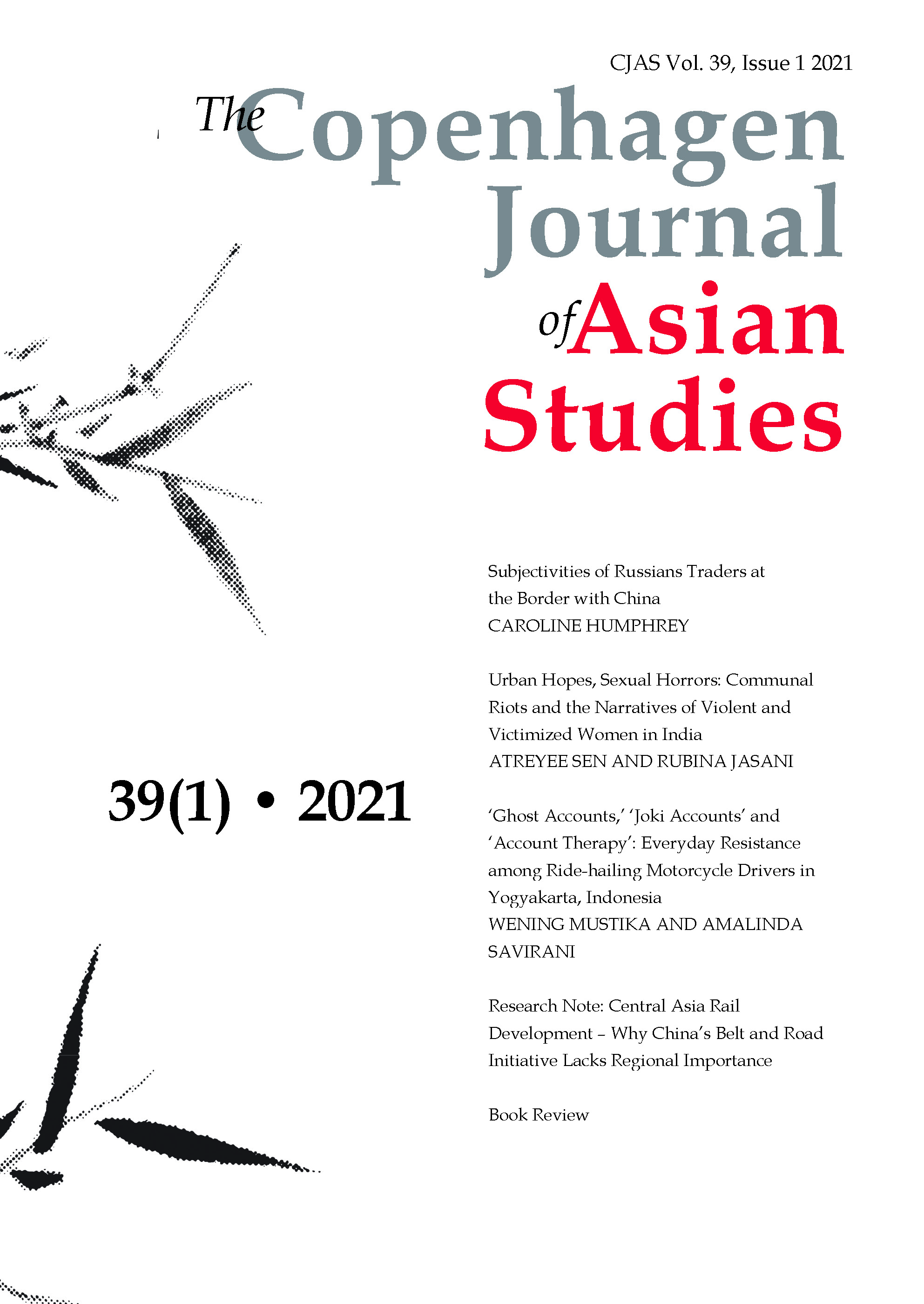‘Ghost Accounts’, ‘Joki Accounts’ and ‘Account Therapy’
Everyday Resistance Among Ride-hailing Motorcycle Drivers in Yogyakarta, Indonesia
DOI:
https://doi.org/10.22439/cjas.v39i1.6175Keywords:
app-based workers, gamification, gig work, platform economy, politics of algorithmAbstract
This article shows how motorcycle taxi drivers in Yogyakarta, Indonesia deal with labour insecurity, tighter competition, minimum social welfare, decreased tariff and bonuses and longer working hours. The article finds that drivers employ diverse strategies to obtain more orders and therefore also more income. Drivers use prohibited mobile application-based technologies, which resemble those of their platforms, as well as non-technological strategies to boost their account’s performance. The article argues that whereas these prohibited practices can be understood as everyday resistance (Scott 1985), as oppositional acts against the holders of power and capital, they are also pragmatic survival tactics. Furthermore, the article shows that although the drivers’ resistance is individual, their knowledge and strategies are sourced and shared collectively through social media platforms. Being widely distributed between drivers and commonly applied by drivers, these strategies have nonetheless not been able to transform driver-company relationships in any significant way.
References
Bellanova, Rocco 2017. ‘Digital, Politics, and Algorithms: Governing Digital Data Through the Lens of Data Protection’. European Journal of Social Theory, 20 (3): 329-347. https://doi.org/10.1177/1368431016679167.
Curchod, Corentin, Gerardo Patriotta, Laurie Cohen and Nicolas Neysen 2020. ‘Working for Algorithm: Power Asymmetries and Agency in Online Work Settings’. Administrative Science Quarterly, 65 (3): 644-676. https://doi.org/10.1177/0001839219867024.
Faizal, Achmad 2020. ‘Gojek Tuyul Ditangkap Polisi, Punya Akun 8.850 Nomor Telepon dan 41 Akun Gojek (Gojek Tuyul was Arrested by The Police, Had an Account of 8,850 Telephone Numbers and 41 Gojek Accounts)’. https://surabaya.kompas.com/read/2020/02/26/17365591/gojek-tuyul-ditangkap-polisi-punya-8850-nomor-telepon-dan-41-akun-gojek?page=all (accessed 17 September 2020).
Fitri, Amalia Nur 2020. ‘Riset UI: Ekosistem Gojek Menyumbang Rp 104,6 Triliun ke Ekonomi Indonesia di 2019 (UI Research: The Gojek Ecosystem Donates IDR 104.6 trillion to the Indonesian Economy in 2019)’. https://industri.kontan.co.id/news/riset-ui-ekosistem-gojek-menyumbang-rp-1046-triliun-ke-ekonomi-indonesia-di-2019 (accessed 23 February 2021).
Ford, Michele and Vivian Honan 2017. ‘The Go-Jek effect’. In E. Jurriens and R. Tapsell (eds.) Digital Indonesia: Connectivity and Divergence. Singapore: ISEAS - Yusof Ishak Institute, pp. 275-288. https://doi.org/10.1355/9789814786003-021.
Friedman, Gerald 2014. ‘Workers without Employers: Shadow Corporations and the Rise of The Gig Economy’. Review of Keynesian Economics, 2(2): 171-188. https://doi.org/10.4337/roke.2014.02.03.
Fuchs, Christian 2014. Digital Labour and Karl Marx. Routledge: New York and London.
Heeks, Richard, Karsten Eskelund, Juan Erasmo Gomez-Morantes, Fareesa Malik and Brian Nicholson 2020. Digital Labour Platforms in the Global South: Filling or Creating Institutional Voids? Manchester Centre for Digital Development Working Paper, 86: 1-14. https://papers.ssrn.com/sol3/papers.cfm?abstract_id=3645389 (accessed 1 September 2020).
Hewison, Kevin and Arne L. Kalleberg 2012. ‘Precarious Work and Flexibilisation in South and Southeast Asia’. American Behavioral Scientist, 57(4): 1-8. https://doi.org/10.1177/0002764212466235.
Hill, Steven 2015. Raw Deal: How the ‘Uber Economy’ and Runaway Capitalism are Screwing Americans Workers. New York: St.Martin’s Press.
Hua, Julietta and Kasturi Ray 2018. ‘Beyond the Precariat: Race, Gender and Labor in The Taxi and Uber Economy’. Social Identities, 24 (2): 271-289. https://.doi.org/10.1080/13504630.2017.1321721.
Kumar, Neha, Nassim Jafari Naimi and Mehrab Bin Morshed 2018. Uber in Bangladesh: The Tangled Web of Mobility and Justice. Proceedings of the ACM on Human-Computer Interaction 2: 1-21. https://dl.acm.org/doi/abs/10.1145/3274367 (accessed 23 February 2021).
Kusumo, Herlambang Jati 2019. ‘Paguyuban Minta Jumlah Driver Ojol Dikontrol Berkala (Paguyuban Asks for the Number of Ojol Drivers to be Controlled Periodically)’. https://ekbis.harianjogja.com/read/2019/08/14/502/1012062/paguyuban-minta-jumlah-driver-ojol-dikontrol-berkala (accessed 23 February 2021).
Malin, Brenton J. and Curry Chandler 2017. ‘Free to Work Anxiously: Splintering Precarity Among Drivers for Uber and Lyft’. Communication, Culture & Critique, 10 (2): 382-400. https://doi.org/10.1111/cccr.12157.
Mannell, Kate 2017. ’Technology Resistance and de Certeau: Deceptive Texting as A Tactic of Everyday Life’. PLATFORM: Journal of Media & Communication, 8 (1): 40–55.
Nastiti, Aulia 2017. Worker Unrest and The Contentious Labor Practice of Ride-hailing Services in Indonesia. Paper presented in the Arryman Symposium at Buffett Institute, Northwestern University. www.isrsf.org (accessed 2 September 2019).
North, Douglass Cecil 1990. Institutions, Institutional Change and Economic Performance. New York: Cambridge University Press.
Peters, Robbie 2020. ‘Motorbike-taxi-drivers as Infrastructure in the Indonesian City’. Ethnos: Journal of Anthropology, 85 (3): 471-490. https://doi.org/10.1080/00141844.2018.1541917.
Prassl, Jeremias and Martin Risak 2017. ‘The Legal Protection of Crowdworkers: Four Avenues for Workers’ Rights in the Virtual Realm’. In P. Meil and V. Kirov (eds.) Policy Implications of Virtual Work. Cham: Palgrave Macmillan, pp. 273-295. https://doi.org/10.1007/978-3-319-52057-5_11.
Schmidt, Florian 2017. Digital Labour Markets in the Platform Economy: Mapping the Political Challenges of Crowd Work and Gig Work. Friedrich-Edbert Stiftung. http://library.fes.de/pdf-files/wiso/13164.pdf (accessed 7 June 2020).
Scholz, Trebor 2016. Uberwork and Underpaid: How Workers are Disrupting Digital Economy. Cambridge: Polity Press.
Scott, James 1985. Weapons of the Weak: Everyday Forms of Peasant Resistance. New Haven: Yale University Press. https://doi.org/10.7202/702219ar.
Sianipar, Tito 2015. ‘Soal Kasus Go-Jek, Ini Pendapat Menaker Hanif Dhakiri (Regarding the Go-Jek Case, This is the Opinion of the Minister of Manpower, Hanif Dhakiri)’. https://nasional.tempo.co/read/717793/soal-kasus-go-jek-ini-pendapat-menaker-hanif-dhakiri/full&view=ok (accessed 19 August 2020).
Srnicek, Nick 2017. Platform Capitalism. Cambridge: Cambridge Polity Press.
Standing, Guy 2011. The Precariat: The New Dangerous Class. London: Bloomsbury Academic.
Sundararajan, Arun 2016. The Sharing Economy: The End of Employment and the Rise of Cloud-based Capitalism. Cambridge: MIT Press.
Tria Kerkvliet, Benedict J. 2009. ‘Everyday Politics in Peasant Societies (and Ours)’. Journal of Peasant Studies, 36 (1): 227-243. https://doi.org/10.1080/03066150902820487.
Tucker, Eric 2018. ‘Uber and the Unmaking and Remaking of Taxi Capitalisms: Technology, Law and Resistance in Historical Perspective’. In D. McKee, F. Makela, T. Scassa and S. Tremblay-Huet (eds.) Law and the ‘Sharing Economy’: Regulating Online Market Platforms. Ottawa: University of Ottawa Press, pp. 357-392. https://doi.org/10.2307/j.ctv5vdczv.15.
Wagner, Kurt and Yoolim Lee 2020. ‘Facebook, PayPal Back Gojek’s Asia Digital Payments Push’. https://www.bloomberg.com/news/articles/2020-06-03/facebook-invests-in-indonesia-s-gojek-in-whatsapp-push (accessed 23 February 2021).
Walandouw, Paksi, et al. 2018. Dampak GOJEK terhadap Perekonomian Yogyakarta Tahun 2018 (The Impact of Gojek on the Yogyakarta Economy in 2018). Jakarta: Lembaga Demografi Universitas Indonesia. https://ldfebui.org/wp-content/uploads/2019/03/LDUI-Dampak-GOJEK-pada-Perekonomian-Yogyakarta-2018.pdf (accessed 22 September 2020).
Wijaya, Calista Anggun 2016, ‘Hundreds of Go-Jek drivers protest ‘unfair policy’, The Jakarta Post, https://www.thejakartapost.com/news/2016/10/03/hundreds-of-go-jek-drivers-protest-unfair-policy.html (accessed 11 February 2021).


